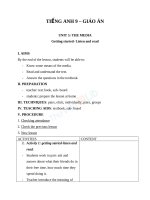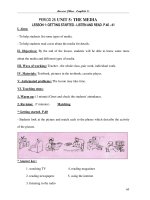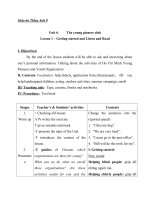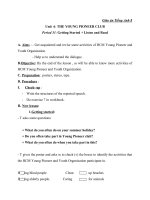Giáo án Tiếng Anh 9 unit 6: The environment
Bạn đang xem bản rút gọn của tài liệu. Xem và tải ngay bản đầy đủ của tài liệu tại đây (150.23 KB, 11 trang )
GIÁO ÁN TIẾNG ANH LỚP 9.
Unit 6: THE ENVIRONMENT
Lesson 1:
GETTING STARTED + LISTEN AND READ
LANGUAGE FOCUS 2
(Period 37)
A. Aim of the lesson:
By the end of the lesson, Students will be able to understand the reading about
environment problems and related words / phrases and the use adverb clauses of
reason: as, because and since.
• Teaching aids: text book, cassette, posters about environment or pictures.
• Anticipated problems:
B. Content:
1. Warm up.
*Brainstorm
- Ss work in group of 3 to 4. Ask Ss to discuss and make a list of people activities
that destroy the environment.
- Suggested answers: throw garbage in the street, cut down trees, leave the lights
on when unnecessary.
2.Vocabulary.
- garbage dump (n) place where the garbage is stored: bãi đổ rác,nơi chứa
rác
- deforestation (n): cutting down the trees in the forest : sự phá rừng
- dynamite fishing(n)
đánh cá bằng chất nổ
- spraying pesticides (n) It uses to kill insects on the farm: phun thuốc trừ
sâu
- (to) spoil (translation)
làm hư hỏng, làm hại
*Checking: Ask Ss to make sentences with the words they have
learned.
3. Pre- reading.
- Get Ss to match 6 pictures with 6 cuewords in the textbook .
4. While− reading.
- 1st reading: Ask Ss to read silently and then check their matching.
- 2nd reading: Ss give correct answers:
a. air pollution
b. spraying pesticides
c. garbage dump
d. water pollution
e. deforestation
f. dynamite fishing
- Tell Ss to listen and read the passage. Call on some Ss to read again.
- Give these words and get Ss to read after: shore, provide, whole, disappointed.
- Ask Ss to match the names in colunm A with the tasks in colunm B. Then write
the full answers:
- Group 1 + f. walk along the shore.
- Group 2 + e. check the sand.
- Group 3 + b. check among the rocks.
- Mr. Jones + a. collect all the bags and take them to the garbage dump.
- Mrs. Smith + c. provide a picnic lunch for everyone.
- Mr. Brown + d. give out the bags.
* Play a game: Using flowers with the questions in it
1. Does Mr Jones collect all the bags and take them to the garbage dump?
2. Should group 2 check among the rocks?
3. What does group 3 have to check?
4. Which group walks along the shore?
5. Please sing a song about the environment?
6. Did Mrs Smith provide a picnick lunch for everyone?
7. Who give out the bags?
8. Please read a poem or tell a short story about environment?
5. Post− reading.
- Let Ss discuss the questions 6 and 7
6. Have you ever done anything similar? If yes, what did you do? Where did you
do it?
-> Yes, we have. We often collect the garbage and sweep up our school yard. Our
school clearn uo the city streets, especially on days before great national holidays.
7. If the pollution continues, what might happen?
-> If the pollution continues, our world becomes a harmful and unpleasant to live.
- Grammar point: LANGUAGE FOCUS 2 (P.54)
a) Model sentences: about Adverb clauses of reason.
Ba is tired because / as / since he stayed up late watching TV.
b) Concept check: Which is main clause? What is its duty? What position does it
stand? What function is because / as / since? Who gives form:
Main Clause + because / as / since + subordinate clause
c) Use: Conjunctions: because, as, since, for (bởi vì), now that / because now (bởi
vì bây giờ) -> As / Since thường đứng ở đầu câu
- Rút gọn mệnh đề trạng ngữ chỉ nguyên nhân thành cụm giới từ because of , due
to, (bởi vì) + N / V-ing khi 2 S giống nhau.
a. because + Pro + be + Adj -> because of + Poss.adj (of Pro) + N (of Adj)
b. because + N + be + Adj
-> Because of + the + Adj + N .
c. because + S + V + O/A
-> due to + Gerund (of V) + O/A.
- Khi mệnh đề nguyên nhân chỉ hành động xẩy ra trước đổi thành: Having P2
- T explains how to do the language focus 2 (P.54)
- Give some sentences to get Ss to do in the textbook.
- Ss make sentences
6. Homework.
- Learn vocabulary by heart. Reread the text and answer questions.
- Make 5 – 10 sentences using the form.
- Workbook: Ex. 4-5 (P.42-43)
- Prepare vocabulary in SPEAK (P.49)
Unit 6: THE ENVIRONMENT
Lesson 2:
SPEAKING + LANGUAGE FOCUS 4-5
(Period 38)
A. Aim of the lesson:
By the end of the lesson , Ss will be able to persuade other people by using
given expressions: I think I should.. Why not ….? Why don’t you….?
• Teaching aids: text book, cassette, posters.
• Anticipated problems:
B. Content:
1. Warm up.
Greetings
Jumbled words:
- Ask Ss put the letters in the right order to make good words: onpitlulo
(pollution), mpud (dump), ira (air), sptesecidi (pesticides), ands(sand)
2. Vocabulary.
- (to) wrap = cover, fold smt
gói, bọc lại
- (to) dissolve - change sth from solid and liquid
làm tan, hoà tan
- garbage bin (n) - a box for storing garbage
thùng rác
- traffic jam (n)-vehicles get stuck in the street kẹt xe, tắc nghẽn giao thông
- (to) decompose (trans)
phân huỷ
- exhaust fume (n): gases escaped from motor vehicles…hơi khói thải ra
- harm (to) (V/N)
làm hại , sự thiệt hại
*Checking: R – O – R
I. Pre- speaking.
-Ss repeat the expression to persuade
- I think you should + V…..
- Won’t you + V …..?
- Why don’t you + V ….?
- Why not + V…?
- What / How about + V-ing….?
- It would be better if you + V…..
- How come + S + V(s)/don’t/doesn’t V? = Why do(n’t)/does(n’t) + S + V ?
II. While- speaking.
- Ask Ss to read the persuading expressions and the idea cues given in the textbook
carefully. Make sure Ss understand all of the ideas suggested.
- Let Ss work in pairs, persuade their partners to do things to protect the
environment.
- Call on some pairs to practice the dialogue.
- Give feed back and suggested answers:
1. A: I think it would be better if we reuse and recycle bottles and cans.
B: Because reusing and recycling bottles can reduce garbage and save natural
resources.
2. A: I think it would be better if we don’t throw trash onto water.
B: Why? How come?
A: Because it can keep the water clean. Polluted water can directly do harm to
people’s health and kill fish.
3. A: I think it would be better if we go to work by bike.
B: Why? How come?
A: Because going to work by bike can save energy and at the same time it can
keep the air cleaner.
4. A: Why don’t we put garbage bins around the school yard?
B: What for?
A: To prevent lazy students from throwing trash. That’s how we can keep the
school yard clean and protect the environment.
5. A: I think we should use public buses instead of motorbikes.
B: Why should we?
A: To avoid traffic jams. Moreover, Using traffic buses can reduce exhaust
fume and therefore we can keep the air cleaner. That’s how we can save the
environment.
III. Post -speaking.
b. Ask Ss to work in group and find the answers to the questionaire .The protecting
the environment
How can we….
* save paper?- We reuse used paper and recycle waste paper.
* use fewer plastic bags? – We save plastic bags, clean and reuse them
* reduce water pollution? – We don’t throw trash or rubish into streams,lakes and
even oceans.
* prevent littering? – We throw garbage into the waste bins…
* reduce air pollution? – We should use public means of transportation instead of
private cars or motorbikes.
* reduce the amount of garbage we produce? – We can reuse and recycle bottles
and cans. And we can bury or burn trash.
* Language focus 4-5.
- Conditional sentences : Type 1
If + S + V(s/es) …, S + will / can….+V……
- Use: the action can happen in the present or future
- Ss do Ex.4-5 (P.56) in the textbook
c. Discuss the best way to protect the environment. (opitional)
IV. Homework.
- Pratice speaking again a,b,c
- What do you do to protect the environment? Write down
- Workbook: Ex.8,9,10 (P.45-46)
- Prepare vocabulary in LISTENING + L F1,3
Unit 6: THE ENVIRONMENT
Lesson 3:
LISTENING + LANGUAGE FOCUS 1,3
(Period 39)
A. Aim of the lesson:
By the end of the lesson , Ss will be able to listen for detailed information and
further improve vocabulary and knowledge about environment. To understand
adjectives + that clause and adverbs
• Teaching aids: text book, cassette, posters.
• Anticipated problems:
B. Content:
1. Warm up.
Greetings
- Answers: - How can we protect the environment? How do you prevent littering?
How do we reduce the amount of garbage?
2. Vocabulary.
- raw sewage (n) untreated wastewater: nước thải chưa qua xử lý, nước cống
- pump (v) (mime / trans)
bơm,đổ , thải
- oil spills (n) the release of oil into the natural environment: tràn ra
- leak (v)
(trans)
rò rỉ
- waste material (n)
vật liệu phế thải
- dump (V/n)
đổ thành đống (rác) , vứt bỏ/đổ ầm xuống/
*Checking: R – O – R
I. Pre - listening:
*Guessing game: Ask Ss to have guesses on how the ocean is polluted
II. While - listening:
- Ss listen to the tape and complete the notes.
- Ss correct the answers.
How the ocean is polluted
Firstly: raw sewage is pumped directly into the sea
Secondly: Garbage is dropped into the sea.
Thirdly: oil spills come from ships at sea.
Next: Waste materials come from factories.
Finally: Oil is washed from the land
III. Post − listening:
*Answer questions:
- Ask Ss to work in pairs, use the notes as the outline and make a short presentation
on how the ocean is polluted. ( Ss can add more ideas of their own in the
presentation)
- Call on some Ss present in front of the class.
- Give feed back on the presentation.
* Language focus 4-5 (P.53,55)
1. Adverbs of manners: =Adj + ly
Extreme – extremely, sad – sadly , slow – slowly,
- happy – happily -> But: friendly (Adj), lovely (Adj), likely (Adj)
- probable – probably, simple-simply
- Except: good – >well . Some Adj/adv: fast, late, hard, early, straight, long, high,
enough, pretty
- Use: - to modify the verb
He runs slowly
- to modify a whole sentence
Luckily, I have found my key
2. Adjectives:
- Stand before nouns and after to be and linkingVerbs: look-appear (trông có vẻ )
become-get-grow (trở nên ), feel, seem, taste (có vị), smell (có mùi), sound
- Sau đại từ phiếm định: something, everything, someone, nothing.
3. Adjective (of emotion)+ that clause
S + be + adj + that + clause
Adj of emotion: happy, glad, pleased, excited, sorry, disappointed, amazed, afraid,
ashamed, afraid, angry, bad, certain, grateful, helpful, hopeful, important,
lucky,sure, thankful, true, wrong.
- Use: with some adjectives of feeling / emotion
- Ss do exercises 1,3 (P.52,55)
- Give the correct sentences.
*Tape transcript:
Our oceans are becoming extremely polluted. Most of this pollution comes
from the land, which means it comes from people. Firstly, There is rawsewage,
which is pumped directly into the sea. Many countries, both developed and
developing, are guilty of doing this. Secondly, ships drop about 6 million tons of
garbage into the sea each year. Thirdly, there are oil spills from ships. A ship has
an accident and oil leaks from the vessel. This not only pollutes the water but also
kills marine life. Next, there are waste materials from factories. Without proper
regulations, factories owners let the waste run directly into the rivers, which then
leads to the sea. And finally, oil is washed from the land. This can be the result of
carelessness or a deliberate dumping of waste.
(guilty: điều sai trái, khiển trách, phạm tội, - delibrate: cố ý, thận trọng, thảo luận
kỹ)
IV. Homework:
- Retell the listening.
- Do exercise1,3 (P.52,55) again
- Workbook: Ex. 1,1,6,7 (P.41,44,45)
- Prepare vocabulary in READING
Unit 6: THE ENVIRONMENT
Lesson 4: READING
(Period 40)
A. Aim of the lesson:
By the end of the lesson , Ss will be able to understand the poem with some old
English by doing Matching exercise and answering questions.
• Teaching aids: text book, posters.
• Anticipated problems:
B. Content:
1. Warm up.
Greetings
- Chatting: Q & A
- Do you like poetry? Do you often read poetry? Who is your favorite poet?
- Have you ever read a poem in English?What is it? Do you understand it?
2. Vocabulary.
-junk-jard (n) a place to store rubbish and waste: bãi chứa đồ phế thải
- precious (a) = valuable
quý, quý giá, quý báu
- treasure (a) valuable/precious things:
kho báu, của cải, kho tàng
- foam
(n) mass of bubbles(bong búng) of air or gas
bọt
- hedge (n) = green fence
hàng rào cây xanh
- nonsense (n) meaningless words or ideas:
lời nói phi lý,sự vô lý (vô nghĩa)
- end up (v) use up / finish :
cạn kiệt, kết thúc
- second – hand (adj) đồ cũ , folk (n) = people: người, stream (n) dòng suối
* Checking: What and Where
I. Pre-reading:
1. Answer questions.
a. How many people are there in the poem ? What is their relationship?
b. Where are they?
c. What problem of the environment is mentioned in the poem?
II. While-reading:
- Ss scan the poem about the environment and then check the pre–questions
- Ss read again and give the correct answers
- Keys:
a.There are two (mum and son)
b. Probably in the forest
c. Pollution
* Matching: Match each word in A to an appropriate explanation in B (P.51)
1.Junk–jard
a, a row of bushes forming a fence
2.end up
b, people
3.treasure
c, a piece of land full of rubbish
4.foam
d, mass of bubble of an air or gas
5.stream
e, a fow of water
6.hedge
f, valuable or precious things
7.folk
g, reach a state of
*Key: 1 - c,
2-g, 3-f
4 – e,
5-d 6-a, 7-b
2. Comprehension questions. (P.51) Lucky lot game.
*Keys:
1. + 4. + 7. + 9. LL
2.- 5.The poet wants us to learn that everyone is responsible for the environment
from pollution / stopping pollution.
3.- 4. No. Because he is right, if he throw the bottles that will be polluting the
woods
5-1. If the pollution goes on, the world will end up like a second hand junk–jard
6.-6. (The answer depends on the students’opinion). Suggestions: I can put trash
bins around school-yard to prevent lazy students from throwing trash and keep the
school –yard clean. In addition, I can put trash bins around my house and keep my
house clean,too.
8.-2.The mother thinks other folk pollute (are responsible for the pollution of)the
environment but not her and her son
10.-3. If the boy keep on asking such questions,his mother will take him home
right a way
III. Post-reading:
- Brainstorming words (from the poem) involving in the environment
*Keys: pollution, junk–jard, litter, plastics, tins, stream, world, foam, bottles,
hedge, throw the bottles, the woods
* Discussion (opitional)
Topic: “What could you do in your school/your house to minimize pollution?”
(minimize (v) giảm đến ít nhất)
- Dividing the class into two groups for them to discuss.
- Feedback -Teacher – whole class
IV. Homework:
- Read and Answer the questions about the poem (P.51)
- Workbook : Do exercises 2,3 (P.41–42)
- Review how to write a letter
Unit 6: THE ENVIRONMENT
Lesson 5: WRITING
(Period 41)
A. Aim of the lesson:
By the end of the lesson , Ss will be able to know how to write a complaint
letter with the right format and language and practice writing one using the cues
given.
• Teaching aids: text book, posters.
• Anticipated problems:
B. Content:
1. Warm up.
Greetings
- T asks : What’s in a formal letter? - Gives Ss an A4 size paper. Ask them to
write the main parts of a formal letter on the paper in good position.
-Answers: Sender’s address,- Receive’s address, -Salutation,-Body,-Signature.
2. Vocabulary.
- complain to sb (v)-> complaint(n) express dissatisfaction: phàn nàn, than phiền
- complication (n)
điều gây rắc rối, sự phức tạp,sự rắc rối
- resolution (n) make a suggestion
quyết định, ý định
- float
(v) (sit/trans)
trôi, nổi, bồng bềnh
- situation
(n) states the reason for writing:
tình huống, hoàn cảnh
- prohibit
(v)
ngăn cản, ngăn cấm
- refreshment (n) rest to make spirit freshed again: sự nghỉ ngơi
- response (v) make an answer, truck (n) strong lorry for heavy goods, break (n)
pause or interval at work(sự ngừng ,nghỉ), fly (n) two-winged insect( ruồi)
*Checking: R – O – R
I. Pre - writing:
* Matching:
A complaint letter has five sections → SCRAP
A
B
1. Situation
b. mentions the problem
2. Complication
a. states the reason for writing
3. Resolution
c. end the letter politely
4. Action
d. makes a suggestion
5. Politeness
e. talks about future action
*Keys: 1 – b
2–a
3–d
4–e
5–c
4. (Ordering the letter section a P.52) Label each section with the appropriate
letter: S_C_R_A_P
*Keys: R: I would suggest….before leaving
S : I am writing….. to the North
A: I look forward to …your company
C: When the trucks….and flies
P: Yours faithfully ….Tran Vu Nhat
*Notes:
The writer’s and receiver’s address must be written on the top.
II. While- writing.
- Reading the production on section b- P.53 individually
- Comprehension questions about the production
a. What do people do in the lake behind your house these days?
b. What make you worried?/ Which problems remain…?
c. To whom do you write the letter to?
d. What suggestion do you want to make?
e. Any future plans you want to make?
*Keys:
a.They begin to catch fish
b.They use electricity to catch fish
c.I write to the head of the local authorities
d.The local authorities should prohibit and fine heavily anyone using electricity to
catch fish
e. Depending on the students’ idea
* Practice writing the letter:
Ask Ss to write the letter
*Suggested writing: (etc)
Dear Mr..........,
I’m writing to you about the problem of fish catching in the lake behind my
house
I am very worried because they don’t use fishing rod or net but use electricity to
catch fish. After a short time they left the lake a lot of small fish died and floated
on the water surface. Other animals such as frogs, toads and even birds have also
died from electric shock waves.
I would suggest the local authorities should prohibit and fine heavily any one
catching fish in this way.
I am looking forward to hearing from you and seeing the actions taken to protect
the environment from the local authorities.
Yours sincerely.
III. Post- writing:
Sharing writings + Teacher correction (if there is enough time)
IV. Homework:
- Complete the writing and Review the grammar points in this unit
- Prepare vocabulary Unit 7 – Getting started & listen and read + LF 2









